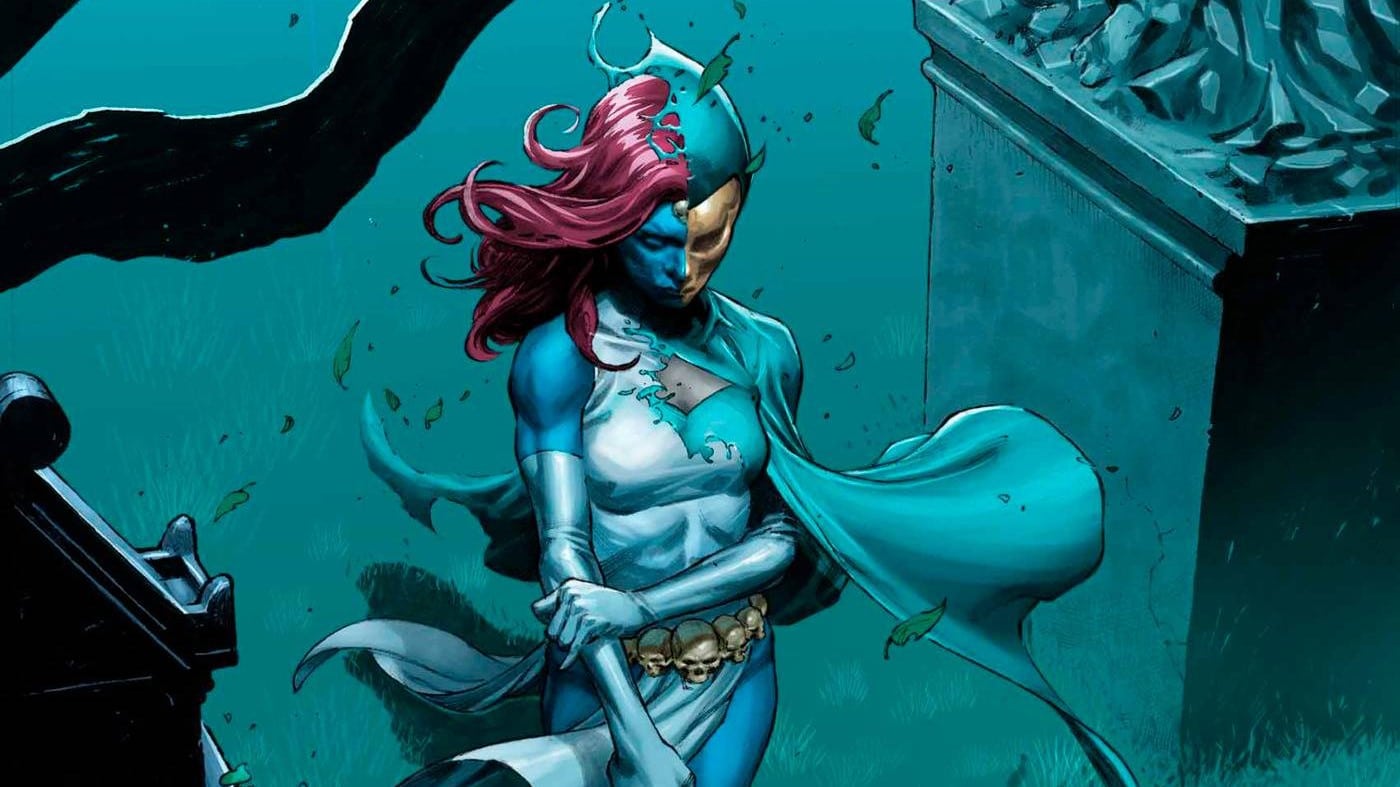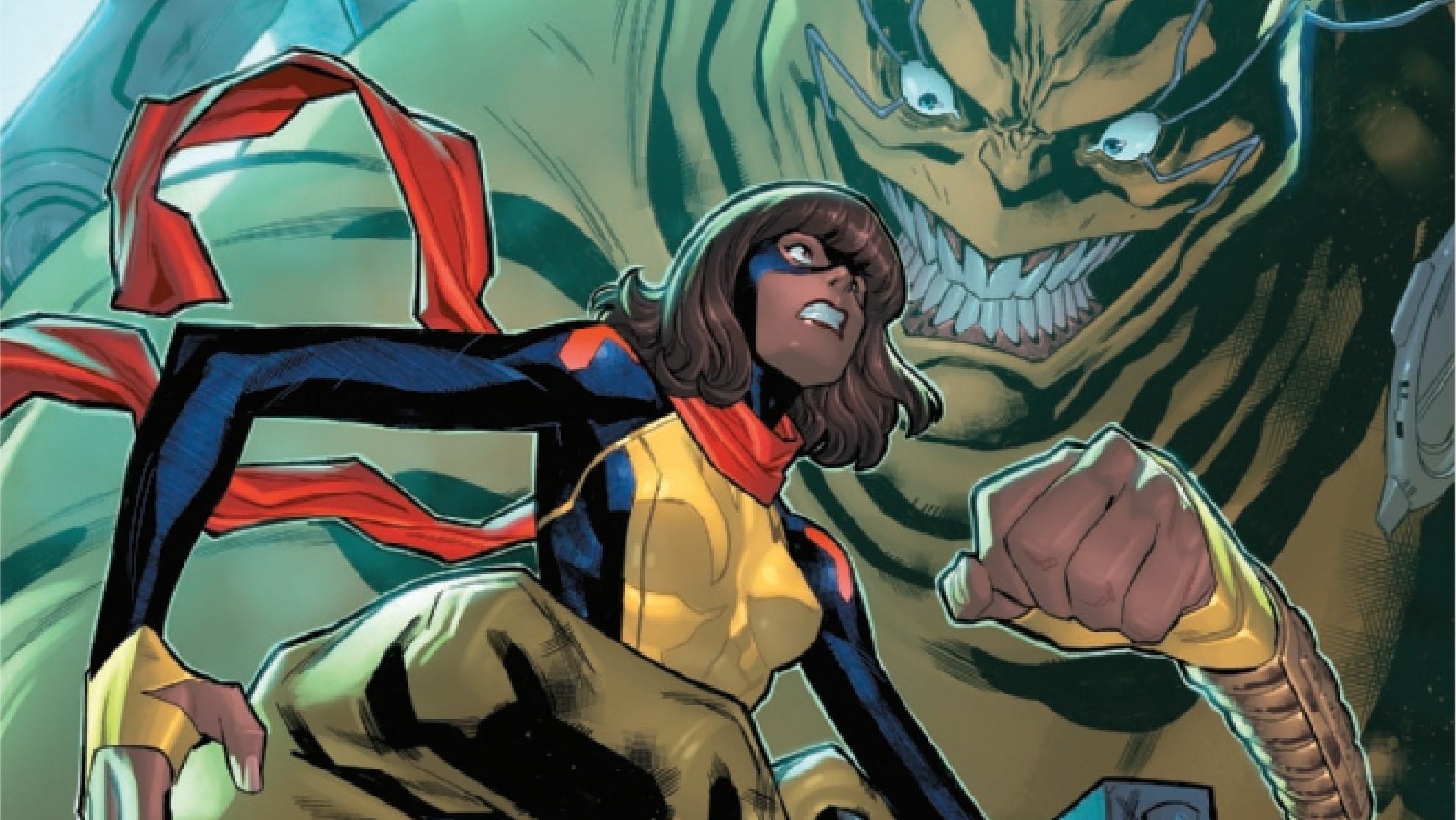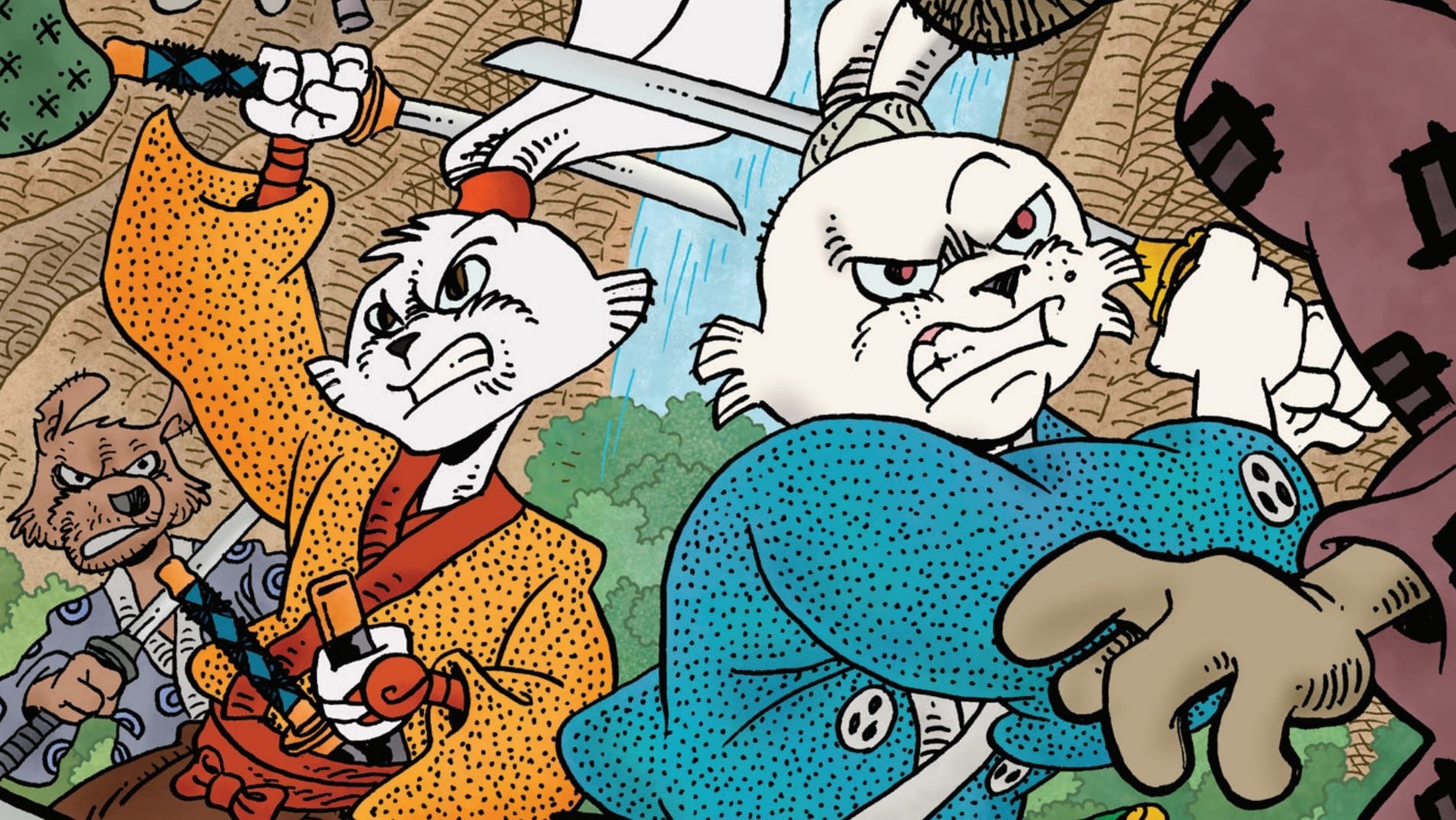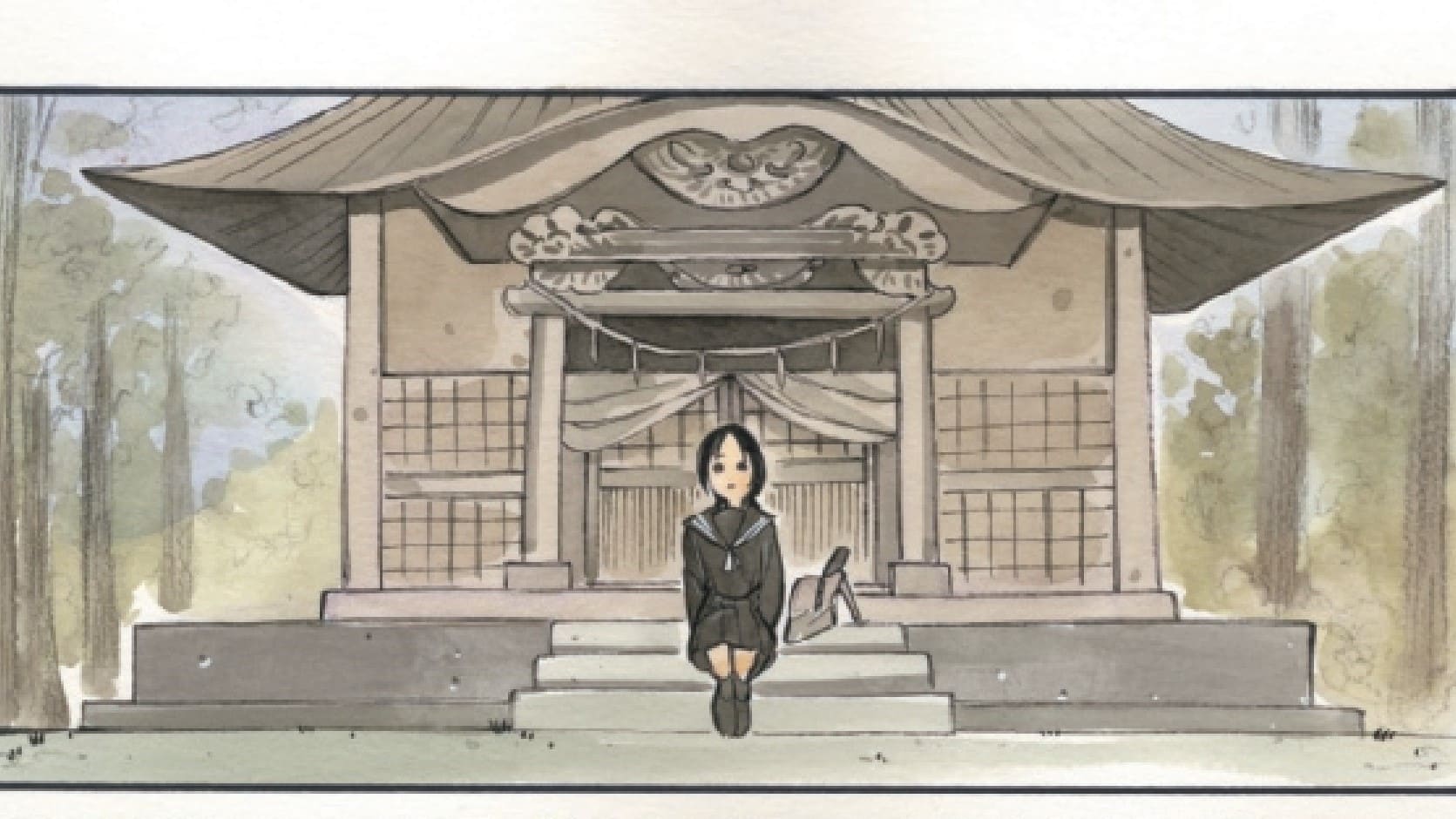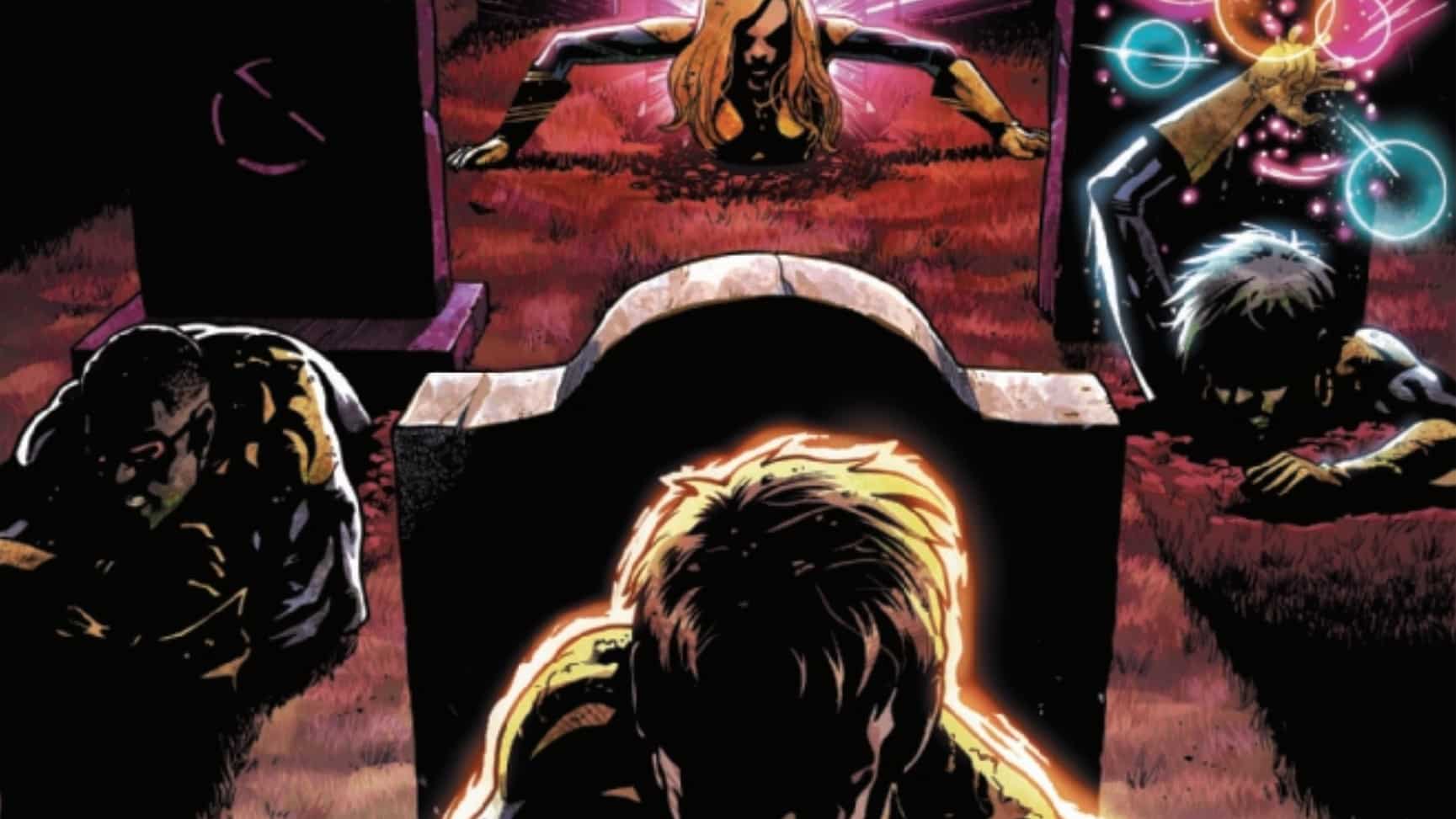If you have made it this far, you know the deal. Inferno #4 by Jonathan Hickman, Valerio Schiti, Stefano Caselli, David Curiel and Joe Sabino.
Chris Eddleman: And with today’s issue, Jonathan Hickman’s time on the X-Men is coming to an end. Obviously, he’s not the only architect of this era of X-Men comics but, he is in many ways sort of the catalyst of them, and also in some ways, this website! And you and I Nola, we get to bring this book to a close as we discuss the dying embers of Inferno. I’m anxious to get started, because there’s kind of a lot to cover!
Nola Pfau: Is it just me, or does it feel pretty weird to cover an Inferno that’s only four issues long? Like, the messy sprawl is just sort of part of the deal, in my mind. But I guess Hickman does tend to write tighter story arcs, so it tracks. Anyway, shall we?
Children of Humanity

Chris: It’s almost as if the creators of this comic were thinking of us specifically because I think it very neatly divides itself into three discussion points. Either that, or this format has poisoned my mind but, regardless that’s where we’re going to do so let’s get into it. One of the big scenes here is Xavier and Magneto tussling with Omega Sentinel and Nimrod, who have become one of my favorite villain duos recently. The fight itself is beautifully rendered by Schiti and Curiel but I wanted to get slightly into the implications of what the machines say.
So in HoXPoX, we learn (through mostly Moira’s perspective, but also through that of the far human Homo novissima) that machines are mostly a stop-gap measure of humanity. They’re meant to sort of buy time so that humanity can progress quickly while mutants have no such measures. The lesson was that Moira was possibly too concerned about Sentinels, etc and not concerned enough about the guided evolutionary destiny of posthumanity.
But in the last issue of Inferno, we get the perspective of Omega Sentinel from the somewhat near future, in which she proclaims that humans and mutants team up to defeat machinekind, eventually even destroying the machine gods that live in a black hole network.
Nola: I mean, I too am locked into thinking of things in this three-subject structure, so I feel you. There are some books that have more, some that have less, but by and large I feel like if we at least try for three we end up with some fairly well-rounded discussion.
What I really liked about the fight scene itself is exactly what you’re diving into here, also. I enjoy the way that Hickman uses the resurrection conceit here, the idea that because Charles’ helmet gets destroyed, he and Erik will remember none of this, which means that the information delivered here is solely for the reader. It’s both a huge exposition dump and a tactically useless fight to show how tough the bad guys are. We get to understand the stakes while the two of them remain as unaware as they were prior to the event. It’s a fascinating bit of narrative trickery.
Chris: Omega Sentinel and Nimrod display an uncaring attitude towards humanity, as they feel (much like mutants) as a marginalized group. From their perspective, mutants and humans are always using them for their goals and consider them objects. This tracks from previous storylines. Obviously we have tons of mutant-killing machines but also things like Danger, who was the sentient Danger Room. She had an entire arc of hating the way she was treated.
I find the different perspectives kind of fascinating. Mutants hate machines and humans, machines hate humans and mutants, humans hate mutants and use machine as a stop gap measure. In fact, Orchis is kind of a play on Omega Sentinel’s concerns, as it’s a group where Machines are using humanity’s hatred as a tool. I think this is adding some much needed nuance to the villains, who just seemed like tools of bigotry. Machines as a marginalized group, while kind of classic as far as scifi is concerned (if not cliche), it was a bit of surprise to see that perspective in X-Men. It feels better than “Inhumans are also marginalized” which was a weird thing that was pushed for awhile.
Nola: You’re absolutely right, it feels like a much more organically (heh) conceived version of that same concept, right down to the express acknowledgement that sometimes marginalized groups can further contribute to the marginalization of other groups. That said, while the idea that mutants and humans both objectify machine sentience is a completely valid one, I find it strange to see that argument falling from the lips of the character from an alternate timeline who has overtaken the current-timeline body of her duplicate without consent. I suppose that’s the ol’ “villain has to do a villainous and/or hypocritical thing to distract everyone from how right they are.”
Moira Ex

Chris: I’m going to be honest here, I was absolutely blown away that Moira X’s goal was still some kind of “mutant cure.” I’m trying to sit with whether or not I think that’s an effective turn or not. Obviously, the entire Krakoan experiment was probably not created as a clever ruse so that Moira could cure every mutant before they even realized they were a mutant but, she’s still awfully stuck on that goal she had so early in her lives. I think I felt a little deflated about the whole thing. I was pretty excited about the Moira possibilities after the initial launch of the line but, her becoming a human with the goal to save mutantkind by becoming a human feels a little bit like a waste to me. But that’s probably more opinion that critique, it was definitely a well choreographed flip to me, even if it takes what interests me about her off the table.
I understand what her perspective is meant to be, she’s simply seen so many mutants killed that she really would just prefer for more people to live as humans rather than die as mutants but there’s definitely some self hatred in there that makes for an interesting character trait.
Also, how ironic (note: I don’t think I’ve ever used the word ironic properly in my life) is it that Moira is right now ready to give up on the current paradigm even though victory is assured? We know through Omega Sentinel’s future story that it was absolutely set to work as it was currently proceeding (barring interference from sneaky machine gods).
Nola: Disappointment is absolutely the watchword here. It’s very frustrating to me that Moira’s arc is to be revealed as a mutant, then revealed as a villain, then given a reformation arc, only to still be revealed as a villain before being depowered. It certainly fits the illusion of change concept that comics are known for, but honestly it’s a rough arc to take with a character who is specifically a) a knowledgeable, independent woman with agency and b) a survivor of domestic abuse.
This was somewhat set up back during HoX/PoX, but the bow on the whole package here is that it means Moira intentionally, upon realizing she was a mutant, entered into a relationship with an abuser solely for the sake of producing another mutant so that…she could eventually engineer a cure for all mutants? It adds a weird layer of duplicitousness to her entire relationship with Joseph MacTaggert, implying that she was using him to achieve her own ends. That’s not to say that it isn’t possible, but it confuses the story regarding that relationship by adding that extra layer, and gives those with the inclination to misread things an easy excuse to say she deserved said abuse at Joseph’s hands. Granted, some of this is purely the fact that as a survivor, Moira is near and dear to my heart, but it’s just…frustrating to see a woman treated this way, doubly so on top of Omega Sentinel’s own loss of agency. It feels like it somewhat betrays the spirit of the original Inferno event, where Madelyne seemed almost self-aware of her loss of agency and determined that if she was going to go out, she’d go out with a bang.
Chris: A part of me wonders if this cure idea is simply a backup plan for her which feels more inevitable as she feels more and more hopeless. It’s hard for me to believe that she fully played the thousand year long game simply to still attempt a cure. Who knows if we’ll see her again but a part of me wonders just how complicated she is. I think your critique in the meantime is valid, and I can’t help but think it just kind of FEELS rushed. Maybe a bit more Moira sprinkling in the last few years could have made me buy this a little bit more.
Nola: Absolutely. Remember when there was gonna be a Moira book? Siiiiigh. Also does this mean that evil sexy Moira from the Muir Island saga was the real Moira all along?
The Doug Days Have Just Begun

Chris: So with ideas of murder dancing in their minds, Mystique and Destiny get ready to off the now human Moira X when suddenly we get a run-in as Doug arrives. Doug’s been absolutely hit-us-on-the-head foreshadowed for this entire miniseries, and this was the proper time for his grand entrance.
So first things first, I think Doug is absolutely emblematic about the successes of Krakoa. He is a non-combat mutant who has been given the chance to shine, practically building the entire island singlehandedly. He has a machine friend, a plant friend, and an Arakkii wife who clearly loves him. Unlike the schemers of the story, Doug is a guy who has gotten along doing what he does best—communicating. Is Doug maybe following rules for the sake of following rules, even though Moira is basically attempting a genocide? Maybe! But I think he’s mostly using that as an excuse to get things done his way. Doug is here for cooperation and collaboration. After the reveal that he knew everything that was going on, I kind of worried that he would become a cynic in the story, but instead the revelation of Moira etc. has just led him to be cautious and prepared with his dear friends. I love this guy.
Nola: Absolutely same. I adore Doug, and it’s so cool to see him be the smartest guy in the room in this way, especially since that’s basically what his mutant power is. I do think his position here is a little both-sidesy about the overall conflict, but not intolerably so. It’s funny to see him quote rules at Mystique, of all people, because she has never cared one whit for anything that remotely resembles a rule. But ah, Destiny is back, and if there’s anyone who can convince Mystique to stay in line, it’s her wife.
Chris: I absolutely love Destiny because in the past she always feels like she’s absolutely in charge. She already knows everything that’s going to happen so even if she gets like knocked out, she can say “just as I predicted.” I think her three-pronged prediction scene was very cool, as we get incredible specifics as opposed to the simple “the future looks cloudy” stuff that a lot of precog business tends to become.
Now the ending of this comic felt…maybe a little too neat for me. So the whole Council learns all about Moira, who is now gone, and we’ve kind of settled into a “toys in the box” status quo. Orchis is still at the same level of power, the Council is largely intact, Moira is elsewhere. The purpose of Inferno was likely to get us to this point, as we know that the X-Office at large wanted to stay in this status quo. But simply looking at this as a story, I can’t help but think the “cute” ending is a little far-fetched for me, at least in terms of working effectively as a story. That’s not to say I didn’t enjoy this issue and this miniseries. I think the art teams worked incredibly well, and the big reveals were enjoyable. Just, a bit tied in a bow here at the end.
Nola: I do like the final status quo of the council at the end, with Xavier’s secrets out and the dynamics completely changed. That Emma line toward the end about it being a curse, instead of simply a burden. Perhaps…a Curse of the Mutants?! [Ed. note: I regret ever starting this damn website…]
X-Traneous Thoughts

- The Emma resurrecting thing is slightly anticlimactic.
- Moira losing an arm and then gaining a Warlock arm is also anticlimactic.
- Remember Moira reading the Book of Destiny? Hmm.
- That panel of Colossus as the “trustworthy.” lol. lmao.
- To be continued, forever

